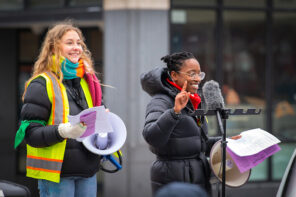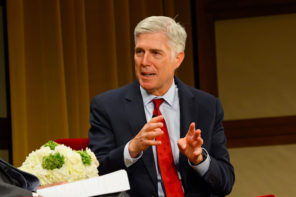When the Supreme Court heard oral arguments in Town of Greece v. Galloway last week it marked the first time in 30 years that the court revisited the issue of prayer in the public square. The question before the court this time is whether it is constitutional for a town council to consistently open its legislative meetings with sectarian prayers.
For many years the town council of Greece, located in upstate New York, has offered these almost exclusively Christian prayers, despite the presence of non-Christians presenting issues before their local government, a position that struck Linda Stephens and Susan Galloway, an atheist and a Jew respectively, as unconstitutional. After they contacted Americans United for Separation of Church and State (AU) in 2007, Rob Boston, Director of Communications for AU, noted how they tried to reach a resolution without success. “When we’ve worked with other similar cases, we tried to reach an agreement between both parties without using the court system. But in this case, the board wasn’t open to any settlement.”
After a district court ruled in favor of the town of Greece AU won at the appellate level on behalf of the plaintiffs. One of the judges in that case, noting that “Roughly two-thirds [of the prayers] contained references to ‘Jesus Christ,’ ‘Jesus,’ ‘Your Son’ or the ‘Holy Spirit,'” concluded that it amounted to an “endorsement” of Christianity.
Following this ruling, the Alliance Defending Freedom (ADF), a leading religious right legal organization, appealed to SCOTUS arguing that pastors should have the freedom to offer prayers in accordance with their religious tradition when speaking on behalf of the government.
Upon initial glance, it seems like a clear violation of church-state separation, but there is a wrinkle. Thirty years earlier, in Marsh v. Chambers, SCOTUS ruled that the Nebraska legislature’s decision to hire a chaplain to open each legislative session with a non-sectarian prayer did not violate the Establishment Clause of the First Amendment of the Constitution.
AU argues that Greece is different for several reasons, according to Boston:
One, the prayers are sectarian. Two, it’s local government. In a statehouse or in U.S. Congress, the prayers are directed at the lawmakers. Legislators appoint chaplains, but the prayers tend to be non-sectarian. Legislators don’t have to be present. In Greece, they are broadcast out toward the community.
The critical issue here, continues Boston, is the element of coercion.
When prayers are directed out toward the community, everyone attending the government meeting is coerced to take part. If they fail to do so by, say, declining to bow their heads, they run the risk of prejudicing the board against them. Since most people approach local government seeking something (a zoning variance, better street lighting, sidewalk repairs, etc.) singling yourself out by refusing to take part in the prayer can be problematic.
In a move that raised some eyebrows the Obama administration filed an amicus brief in support of Greece and the ADF. Solicitor General Donald Verrilli’s brief referred to the 1983 Marsh ruling, arguing that “Courts should not parse or evaluate the content of prayer.”
The other briefs filed were, predictably, split along ideological lines with conservative groups and individuals filing on behalf of the petitioner, and their liberal counterparts filing on behalf of the respondents. Unlike the throngs of protestors surrounding the courthouse during DOMA and Prop. 8 debates, only a few dozen people joined American Atheists and the Secular Coalition of America in demonstrating outside the court accompanied by an even smaller number of conservative Christian protestors.
According to Boston, their opponents on the religious right say AU is trying to make an artificial distinction between state legislative prayer and local government prayer. “We assert that the two bodies are different, and therefore different rules should apply.” However, AU’s position only applies to sectarian prayers that favor one faith over another. They do not assert that all prayer should be removed from government bodies. “That would require SCOTUS to overturn their 1983 Marsh ruling, a decision that is extremely unlikely given this court.”
Also, Boston explains why getting rid of the prayers entirely isn’t at issue in this case.
Marsh v. Chambers is the controlling case. It allows a certain degree of prayer at legislative meetings. The question is, did the town of Greece go too far by consistently using Christian prayers? We argue that they did. Having said that, it is possible that the court could issue a ruling allowing communities to use invocations as long as a good-faith effort is made to encompass all points of view. A ruling like that could open the door to non-theistic invocations.
Here AU’s position differs slightly from other organizations promoting separation of church and state like the Baptist Joint Committee for Religious Liberty which filed an amicus brief, along with the United Church of Christ and Presbyterian Church (U.S.A.), in support of the respondents. According to Holly Hollman, general counsel of the Baptist Joint Committee, “While we do not say Marsh is wrongly decided (and neither did AU), we say that it does not apply to state and local governments, even if it is non-sectarian as AU argues it must be.” In other words, while AU argues that the issue is the sectarianism of the prayers in question these groups argue that prayer itself doesn’t belong in state and local government business.
The Secular Coalition of America explained why it agrees with the no prayer position: “Our stance is that any prayer, by definition is non-inclusive, because it excludes non-theists and others who don’t feel comfortable with public displays of religion. So, we think there should be no prayer.”
A ruling is not expected until June 2014, so for now we may have to make due with RD contributor Peter Laarman’s recent reflection on how the Almighty might view a debate over prayer at a poorly attended local town meeting.
But while Greece’s meetings may not attract much of a following, Pew Research Center’s David Masci disagrees with those who believe the case will only apply to local government: “Galloway holds direct implications for the practice of legislative prayer, which exists at every level of government in the United States, from Congress to local school boards.”




